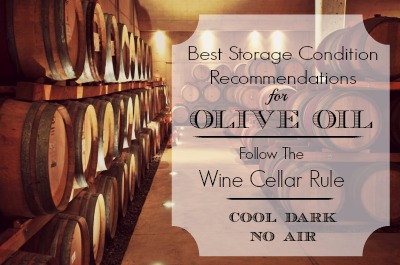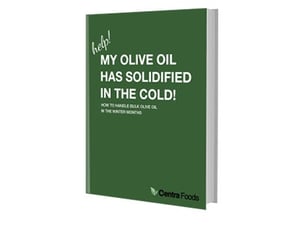
How you store your bulk olive oil can’t just be an afterthought once it delivers. Getting olive oil and storing it in the wrong conditions is like buying ice cream from the store and taking 8 hours to get home and put it into the freezer.
You have to plan what you’re going to do with it before you buy -- in particular if you are a manufacturer, because there's more oil (and money) at stake. But manufacturer or home chef aside, the same still applies.
Respect olive oil's proper storage conditions, and you will enjoy it -- in its freshest form -- for as long as possible.
What The Proper Storage Conditions For Olive Oil?
Olive oil likes to be cool, dark and kept away from oxygen. Think of a wine cellar, and you’ll be headed in the right direction.
Keep It Cool
Ideally, olive oil likes to be kept at ambient room temperature or slightly cooler (think 50°-70° F). Try to keep it away from the hot sun, being stored outside in the summer, near a heater, by a hot sunny window, etc. That said, it doesn't need to be put in cold storage -- ambient storage will work just fine.
If you DO want to put it in cold storage, you technically can. You can refrigerate it, though it may solidify. That’s an easy fix though -- just bring it back to room temperature before you want to use it and it will return to it’s normal liquid state. If you are dealing with a retail bottle, you can just fill your sink with warm water and place the bottle in it for 10-20 minutes. Just be aware that some of the olive oil particles/natural waxes may settle to the bottom of the container if you are dealing with EVOO.
 To de-thaw larger bulk sizes, it can take a bit more finagling, and there's a different system we recommend for each packaging size. Just remember to give it up to a week to come back to it’s normal consistency, because it can take longer than you may think. If you want to know more specifics on how long it takes to defrost for each bulk packaging size, read this article.
To de-thaw larger bulk sizes, it can take a bit more finagling, and there's a different system we recommend for each packaging size. Just remember to give it up to a week to come back to it’s normal consistency, because it can take longer than you may think. If you want to know more specifics on how long it takes to defrost for each bulk packaging size, read this article.
And if you really want to learn more on how to handle olive oil if it has solidified in the cold, you can read through this eBook which goes through all the specifics: Help! My Olive Oil Has Solidified In The Cold!
Keep It Dark
It’s ideal to store your olive oil in a container that prevents light from getting in. If you are buying from a retail store for your kitchen, look for a dark green bottle. These colored bottles were created specifically to help keep light out and preserve the oil's quality during transport and storage. That way, when you open your bottle, it's as fresh as possible. On top of that, keep what you aren't using on a daily basis stored in the cupboard away from the light in your kitchen.
If you buy olive oil in bulk, look for a cardboard tote, drum, or even a 35 Lb. Container. Each of these options will shield the oil from getting much, if any, light in. Light can speed up the oxidation process, which isn't ideal for preserving oil.
Keep It Sealed From Air
If at all possible, keep your oil away from air. Oxygen can definitely speed up the oxidation process. In a home kitchen, keep it in a closed bottle (not the glass bottles with the pretty open-top pour spouts, sorry).
In a bulk production setting, choose cardboard totes or 35 Lb. Containers. If you go with the cardboard totes, the bag collapses around the oil as it is used, keeping oxygen away from it. In contract, the IBC plastic tote remains a hard box while you dispense your oil, and air circulates within that tote constantly. The 35 Lb. Containers allow you to only open a few gallons of oil at a time, which means that each of the remaining closed container is kept away from open, circulating oxygen.
Keep in mind, olive oil can last up to 2 years from the date of manufacture -- but only if you store it with these proper conditions. If you want to play it safe, plan to use your oil within 6-12 months of purchasing it.
What Happens If You Don’t Store Your Oil Properly
If your oil gets too hot or exposed to too much light or oxygen, it will go rancid. While it's not like dairy going rancid (it's still safe to eat, and shouldn't make you sick) it won't taste great, and can have an unpleasant flavor and/or odor. It may also turn light in color and lose its flavor or get a musty/old flavor to it.
If any of these storage conditions, like sun and heat, aren't followed, they can cause cause the oil to degrade faster than it should. I wanted to do an experiment in my home, to see exactly how these poor conditions could affect the olive oil. Phew! Glad I took some photos, because it was very enlightening.
My Personal Experiment
My experiment started with our Extra Virgin Olive Oil. Both photos below are of the exact same lot of oil.
In the photo below on the left, you will see an OLD bottle of that oil that has been stored on my kitchen counter for 3 months while I was away. My kitchen was light filled, and though you can't see the very top, it's in an open-top pour-spout bottle. This example has ALL the quality damaging culprits at hand:
- It was left directly on my counter, right in the path of sunlight from the window. This kitchen was warm, and the daily sunbeam was even warmer.
- The bottle is clear, which means that the sunlight light is getting in through the sides of the bottle.
- The bottle is an open pour top -- while it looks pretty, it's letting in air all of the time.
Take notice of the color: Light, almost the color of canola oil! That's not how it started. It also smelled yucky... old, musty, just OFF.
 To get the photo above on the right, I dumped out the old oil bottle, cleaned it and pulled out the gallon of the same lot of EVOO (which was stored away in my cupboard -- you know, in a closed, dark, cool environment). Then I refilled this glass cruet and took the photo with fresh oil. Much better! That's how it should look!
To get the photo above on the right, I dumped out the old oil bottle, cleaned it and pulled out the gallon of the same lot of EVOO (which was stored away in my cupboard -- you know, in a closed, dark, cool environment). Then I refilled this glass cruet and took the photo with fresh oil. Much better! That's how it should look!
These photos were taken within a 2 minute time period of each other, and it's from the exact same original gallon of oil. Goes to show you how much light, air and heat can affect the quality of your oil!
Needless to say, this open top bottle has been put aside, and I now use GREEN, SEALED re-fillable bottles only, and I keep them away from the sun and heat.
Give Your Oil A Fighting Chance
If you keep your olive oil in hot/sunny locations or continuously allow air to get in, the above experiment is what is slowly happening to your olive oil, day by day. Make proper arrangements before you buy your olive oil to store it so that it’s still good for months to come.
This post was originally published May 13, 2014, and has been reviewed and updated for content comprehensiveness.
Topics: Quality Control, Olive Oil












